LST2LBA: Law of Business Association Assignment - SP2 2018
VerifiedAdded on 2023/06/04
|7
|1787
|227
Homework Assignment
AI Summary
This document presents a comprehensive solution to a business law assignment, addressing two key scenarios related to contract law and corporate authority within the framework of the Corporations Act. The first question analyzes the enforceability of a contract signed by a company director and secretary, examining the application of section 127 of the Corporations Act concerning the valid execution of documents, and the implications of authority conferred under section 126. The second question focuses on the enforceability of a contract created by an agent, exploring concepts of actual and ostensible authority, with a focus on section 127(2) regarding the use of a company seal. The solution delves into legal principles, providing an analysis of relevant case law and statutory provisions to determine the validity of the contracts and the extent of the parties' liabilities. The assignment uses the Corporations Act 2001 to determine the validity of contracts and the authority of company representatives, providing a clear conclusion for each scenario.
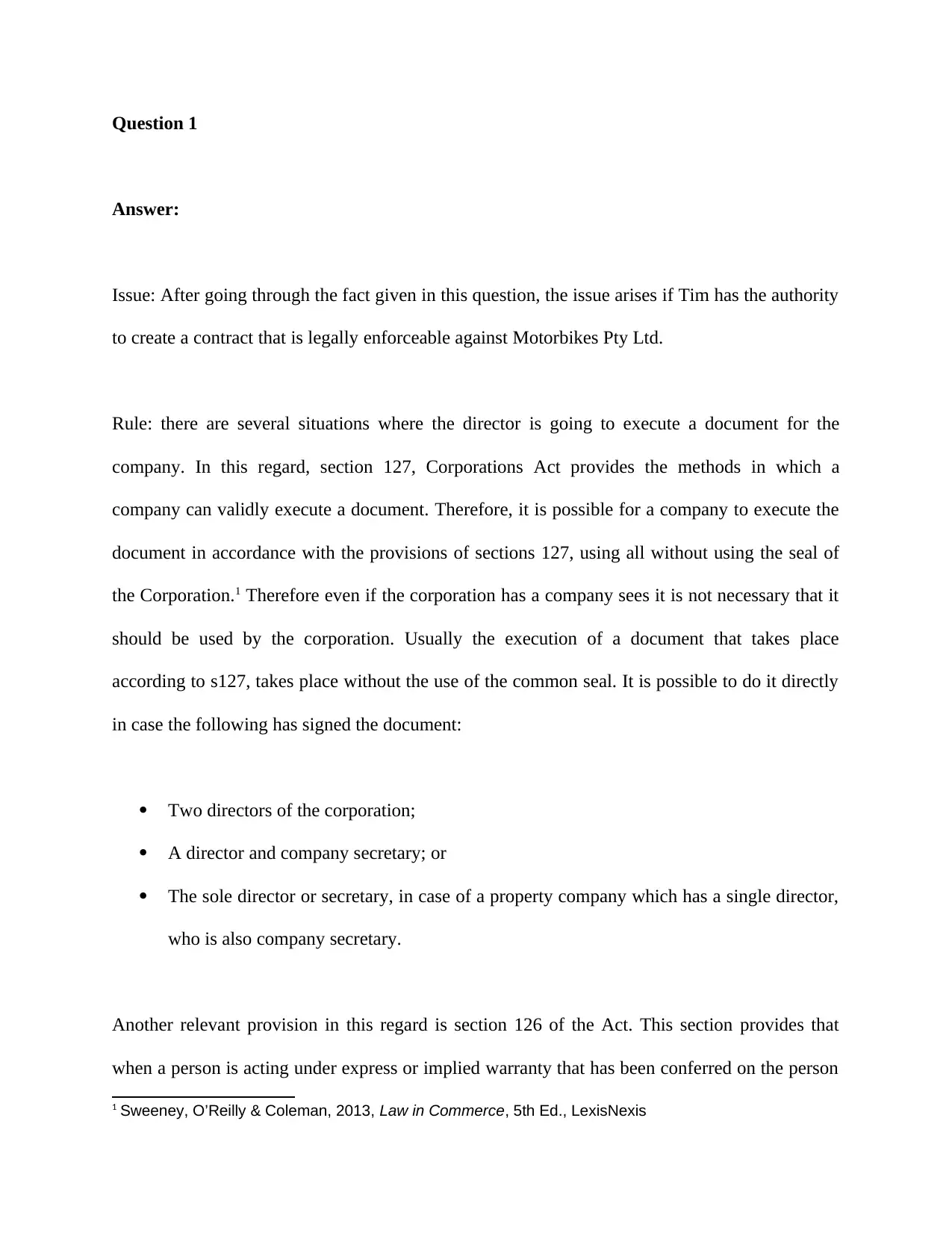
Question 1
Answer:
Issue: After going through the fact given in this question, the issue arises if Tim has the authority
to create a contract that is legally enforceable against Motorbikes Pty Ltd.
Rule: there are several situations where the director is going to execute a document for the
company. In this regard, section 127, Corporations Act provides the methods in which a
company can validly execute a document. Therefore, it is possible for a company to execute the
document in accordance with the provisions of sections 127, using all without using the seal of
the Corporation.1 Therefore even if the corporation has a company sees it is not necessary that it
should be used by the corporation. Usually the execution of a document that takes place
according to s127, takes place without the use of the common seal. It is possible to do it directly
in case the following has signed the document:
Two directors of the corporation;
A director and company secretary; or
The sole director or secretary, in case of a property company which has a single director,
who is also company secretary.
Another relevant provision in this regard is section 126 of the Act. This section provides that
when a person is acting under express or implied warranty that has been conferred on the person
1 Sweeney, O’Reilly & Coleman, 2013, Law in Commerce, 5th Ed., LexisNexis
Answer:
Issue: After going through the fact given in this question, the issue arises if Tim has the authority
to create a contract that is legally enforceable against Motorbikes Pty Ltd.
Rule: there are several situations where the director is going to execute a document for the
company. In this regard, section 127, Corporations Act provides the methods in which a
company can validly execute a document. Therefore, it is possible for a company to execute the
document in accordance with the provisions of sections 127, using all without using the seal of
the Corporation.1 Therefore even if the corporation has a company sees it is not necessary that it
should be used by the corporation. Usually the execution of a document that takes place
according to s127, takes place without the use of the common seal. It is possible to do it directly
in case the following has signed the document:
Two directors of the corporation;
A director and company secretary; or
The sole director or secretary, in case of a property company which has a single director,
who is also company secretary.
Another relevant provision in this regard is section 126 of the Act. This section provides that
when a person is acting under express or implied warranty that has been conferred on the person
1 Sweeney, O’Reilly & Coleman, 2013, Law in Commerce, 5th Ed., LexisNexis
Paraphrase This Document
Need a fresh take? Get an instant paraphrase of this document with our AI Paraphraser
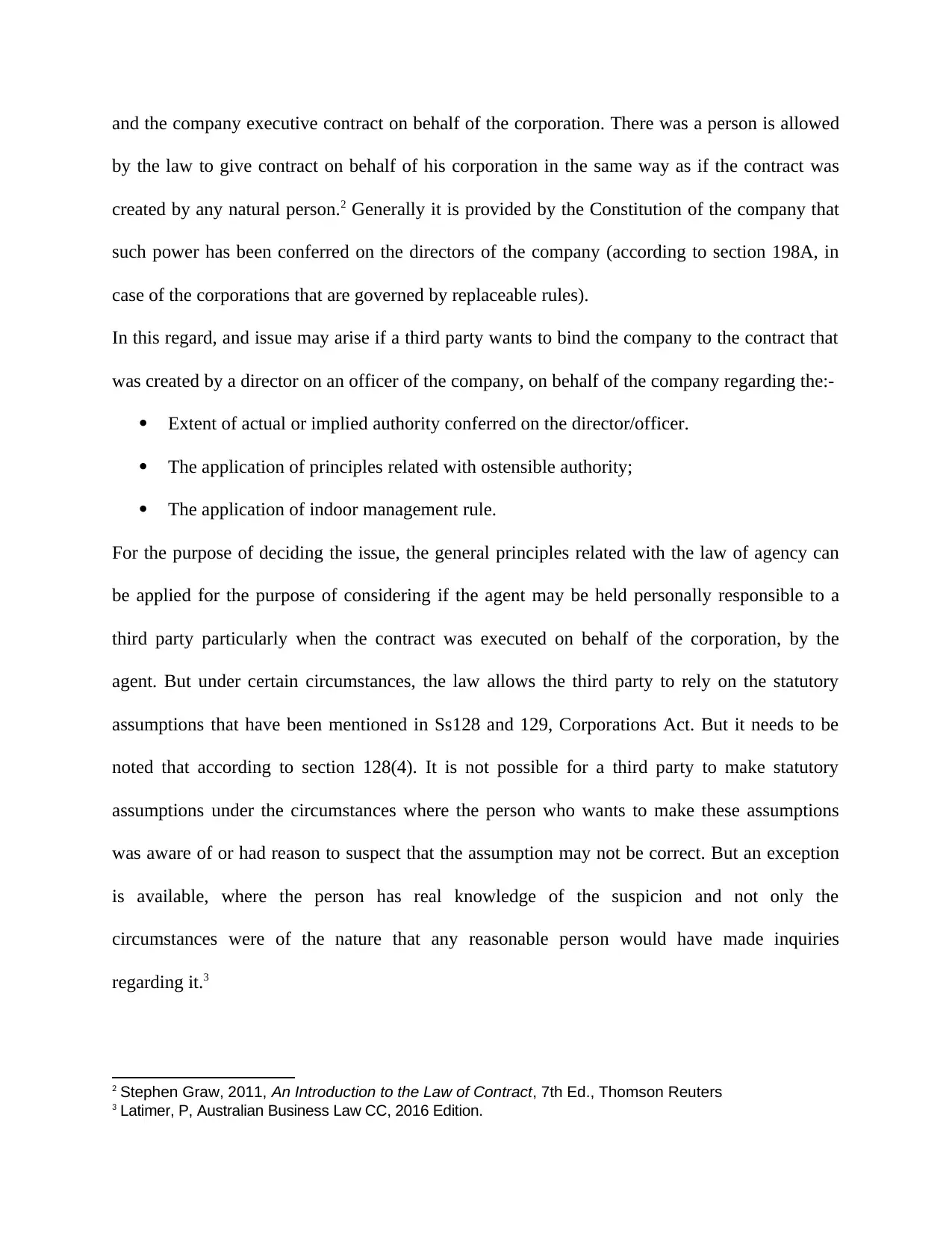
and the company executive contract on behalf of the corporation. There was a person is allowed
by the law to give contract on behalf of his corporation in the same way as if the contract was
created by any natural person.2 Generally it is provided by the Constitution of the company that
such power has been conferred on the directors of the company (according to section 198A, in
case of the corporations that are governed by replaceable rules).
In this regard, and issue may arise if a third party wants to bind the company to the contract that
was created by a director on an officer of the company, on behalf of the company regarding the:-
Extent of actual or implied authority conferred on the director/officer.
The application of principles related with ostensible authority;
The application of indoor management rule.
For the purpose of deciding the issue, the general principles related with the law of agency can
be applied for the purpose of considering if the agent may be held personally responsible to a
third party particularly when the contract was executed on behalf of the corporation, by the
agent. But under certain circumstances, the law allows the third party to rely on the statutory
assumptions that have been mentioned in Ss128 and 129, Corporations Act. But it needs to be
noted that according to section 128(4). It is not possible for a third party to make statutory
assumptions under the circumstances where the person who wants to make these assumptions
was aware of or had reason to suspect that the assumption may not be correct. But an exception
is available, where the person has real knowledge of the suspicion and not only the
circumstances were of the nature that any reasonable person would have made inquiries
regarding it.3
2 Stephen Graw, 2011, An Introduction to the Law of Contract, 7th Ed., Thomson Reuters
3 Latimer, P, Australian Business Law CC, 2016 Edition.
by the law to give contract on behalf of his corporation in the same way as if the contract was
created by any natural person.2 Generally it is provided by the Constitution of the company that
such power has been conferred on the directors of the company (according to section 198A, in
case of the corporations that are governed by replaceable rules).
In this regard, and issue may arise if a third party wants to bind the company to the contract that
was created by a director on an officer of the company, on behalf of the company regarding the:-
Extent of actual or implied authority conferred on the director/officer.
The application of principles related with ostensible authority;
The application of indoor management rule.
For the purpose of deciding the issue, the general principles related with the law of agency can
be applied for the purpose of considering if the agent may be held personally responsible to a
third party particularly when the contract was executed on behalf of the corporation, by the
agent. But under certain circumstances, the law allows the third party to rely on the statutory
assumptions that have been mentioned in Ss128 and 129, Corporations Act. But it needs to be
noted that according to section 128(4). It is not possible for a third party to make statutory
assumptions under the circumstances where the person who wants to make these assumptions
was aware of or had reason to suspect that the assumption may not be correct. But an exception
is available, where the person has real knowledge of the suspicion and not only the
circumstances were of the nature that any reasonable person would have made inquiries
regarding it.3
2 Stephen Graw, 2011, An Introduction to the Law of Contract, 7th Ed., Thomson Reuters
3 Latimer, P, Australian Business Law CC, 2016 Edition.
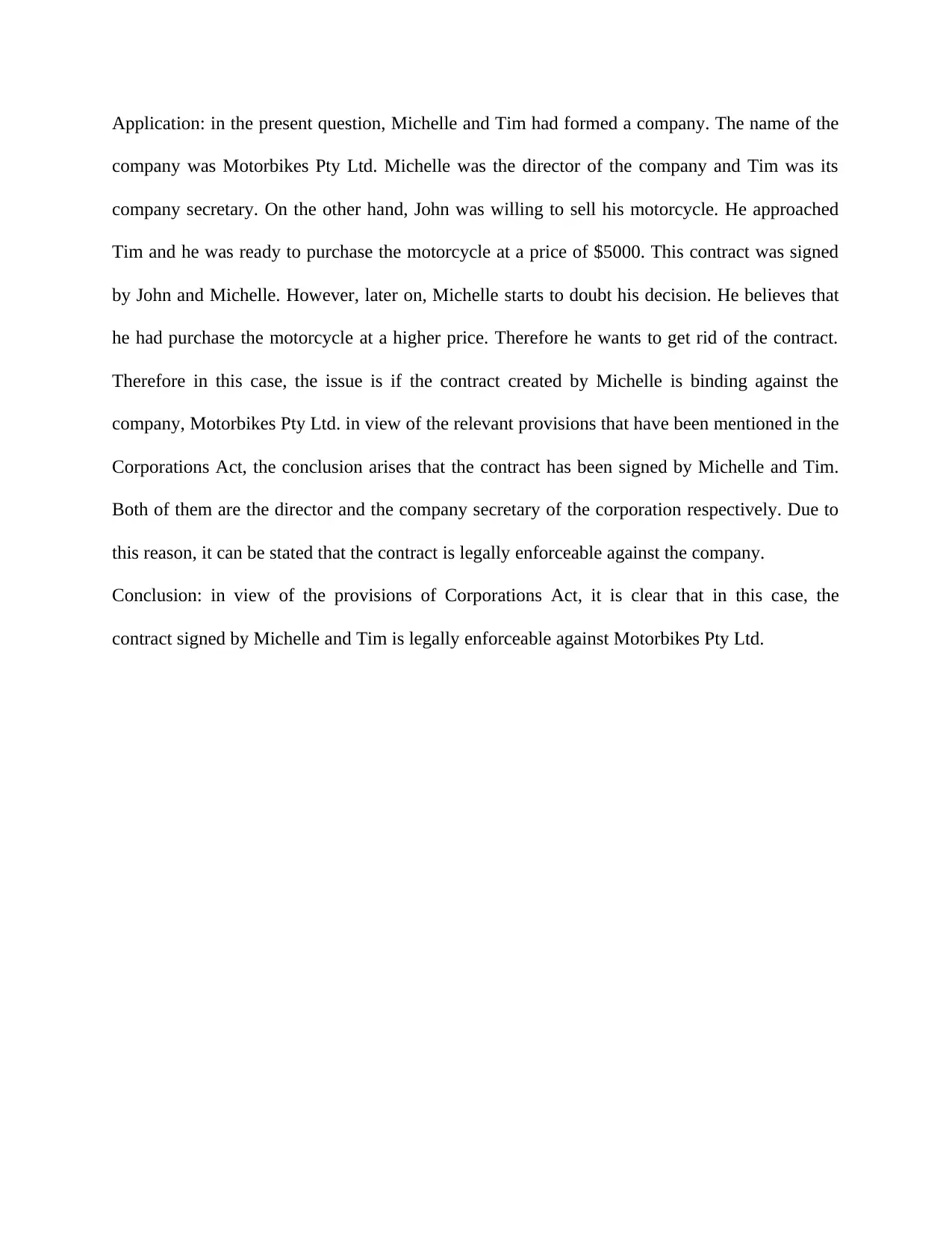
Application: in the present question, Michelle and Tim had formed a company. The name of the
company was Motorbikes Pty Ltd. Michelle was the director of the company and Tim was its
company secretary. On the other hand, John was willing to sell his motorcycle. He approached
Tim and he was ready to purchase the motorcycle at a price of $5000. This contract was signed
by John and Michelle. However, later on, Michelle starts to doubt his decision. He believes that
he had purchase the motorcycle at a higher price. Therefore he wants to get rid of the contract.
Therefore in this case, the issue is if the contract created by Michelle is binding against the
company, Motorbikes Pty Ltd. in view of the relevant provisions that have been mentioned in the
Corporations Act, the conclusion arises that the contract has been signed by Michelle and Tim.
Both of them are the director and the company secretary of the corporation respectively. Due to
this reason, it can be stated that the contract is legally enforceable against the company.
Conclusion: in view of the provisions of Corporations Act, it is clear that in this case, the
contract signed by Michelle and Tim is legally enforceable against Motorbikes Pty Ltd.
company was Motorbikes Pty Ltd. Michelle was the director of the company and Tim was its
company secretary. On the other hand, John was willing to sell his motorcycle. He approached
Tim and he was ready to purchase the motorcycle at a price of $5000. This contract was signed
by John and Michelle. However, later on, Michelle starts to doubt his decision. He believes that
he had purchase the motorcycle at a higher price. Therefore he wants to get rid of the contract.
Therefore in this case, the issue is if the contract created by Michelle is binding against the
company, Motorbikes Pty Ltd. in view of the relevant provisions that have been mentioned in the
Corporations Act, the conclusion arises that the contract has been signed by Michelle and Tim.
Both of them are the director and the company secretary of the corporation respectively. Due to
this reason, it can be stated that the contract is legally enforceable against the company.
Conclusion: in view of the provisions of Corporations Act, it is clear that in this case, the
contract signed by Michelle and Tim is legally enforceable against Motorbikes Pty Ltd.
⊘ This is a preview!⊘
Do you want full access?
Subscribe today to unlock all pages.

Trusted by 1+ million students worldwide
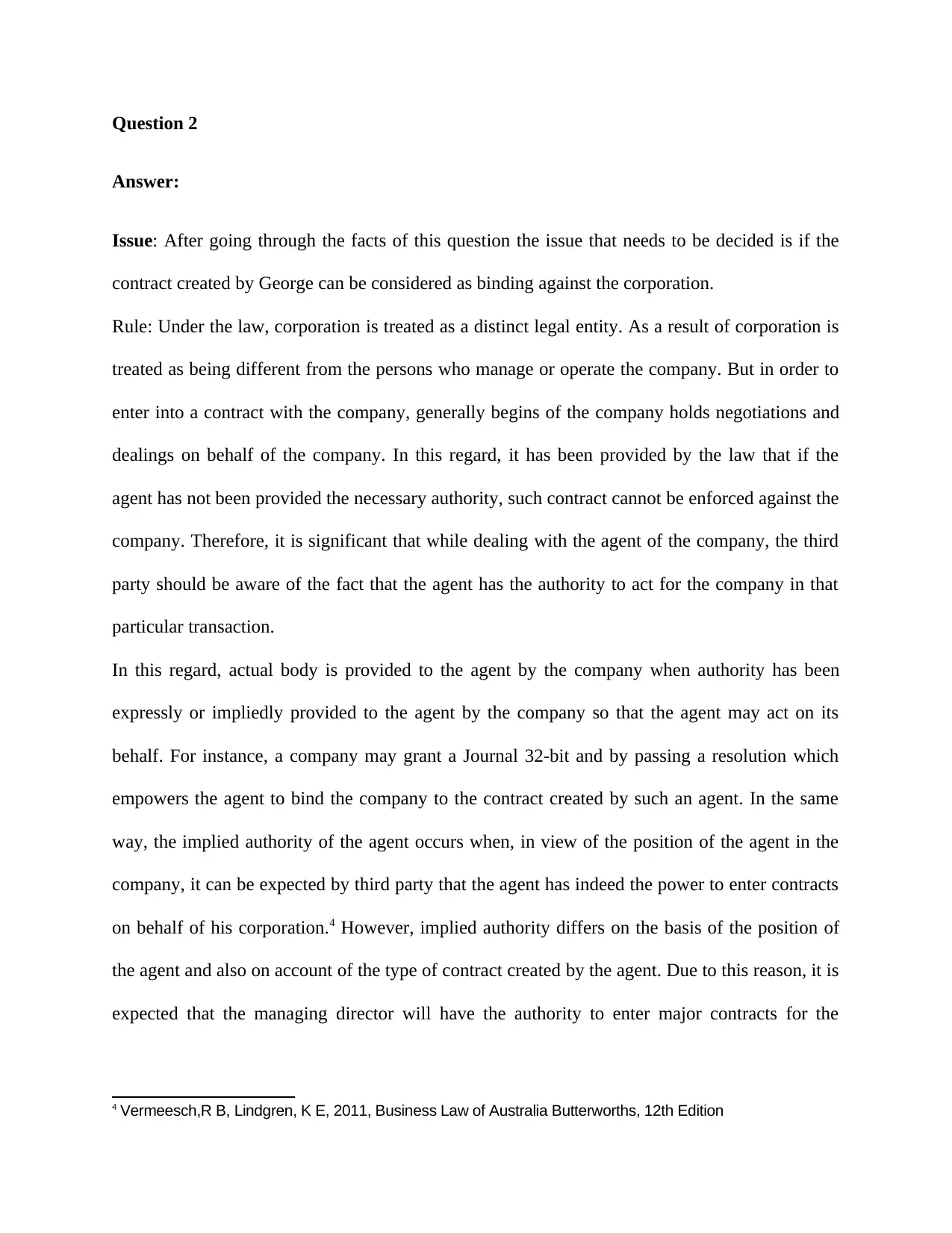
Question 2
Answer:
Issue: After going through the facts of this question the issue that needs to be decided is if the
contract created by George can be considered as binding against the corporation.
Rule: Under the law, corporation is treated as a distinct legal entity. As a result of corporation is
treated as being different from the persons who manage or operate the company. But in order to
enter into a contract with the company, generally begins of the company holds negotiations and
dealings on behalf of the company. In this regard, it has been provided by the law that if the
agent has not been provided the necessary authority, such contract cannot be enforced against the
company. Therefore, it is significant that while dealing with the agent of the company, the third
party should be aware of the fact that the agent has the authority to act for the company in that
particular transaction.
In this regard, actual body is provided to the agent by the company when authority has been
expressly or impliedly provided to the agent by the company so that the agent may act on its
behalf. For instance, a company may grant a Journal 32-bit and by passing a resolution which
empowers the agent to bind the company to the contract created by such an agent. In the same
way, the implied authority of the agent occurs when, in view of the position of the agent in the
company, it can be expected by third party that the agent has indeed the power to enter contracts
on behalf of his corporation.4 However, implied authority differs on the basis of the position of
the agent and also on account of the type of contract created by the agent. Due to this reason, it is
expected that the managing director will have the authority to enter major contracts for the
4 Vermeesch,R B, Lindgren, K E, 2011, Business Law of Australia Butterworths, 12th Edition
Answer:
Issue: After going through the facts of this question the issue that needs to be decided is if the
contract created by George can be considered as binding against the corporation.
Rule: Under the law, corporation is treated as a distinct legal entity. As a result of corporation is
treated as being different from the persons who manage or operate the company. But in order to
enter into a contract with the company, generally begins of the company holds negotiations and
dealings on behalf of the company. In this regard, it has been provided by the law that if the
agent has not been provided the necessary authority, such contract cannot be enforced against the
company. Therefore, it is significant that while dealing with the agent of the company, the third
party should be aware of the fact that the agent has the authority to act for the company in that
particular transaction.
In this regard, actual body is provided to the agent by the company when authority has been
expressly or impliedly provided to the agent by the company so that the agent may act on its
behalf. For instance, a company may grant a Journal 32-bit and by passing a resolution which
empowers the agent to bind the company to the contract created by such an agent. In the same
way, the implied authority of the agent occurs when, in view of the position of the agent in the
company, it can be expected by third party that the agent has indeed the power to enter contracts
on behalf of his corporation.4 However, implied authority differs on the basis of the position of
the agent and also on account of the type of contract created by the agent. Due to this reason, it is
expected that the managing director will have the authority to enter major contracts for the
4 Vermeesch,R B, Lindgren, K E, 2011, Business Law of Australia Butterworths, 12th Edition
Paraphrase This Document
Need a fresh take? Get an instant paraphrase of this document with our AI Paraphraser
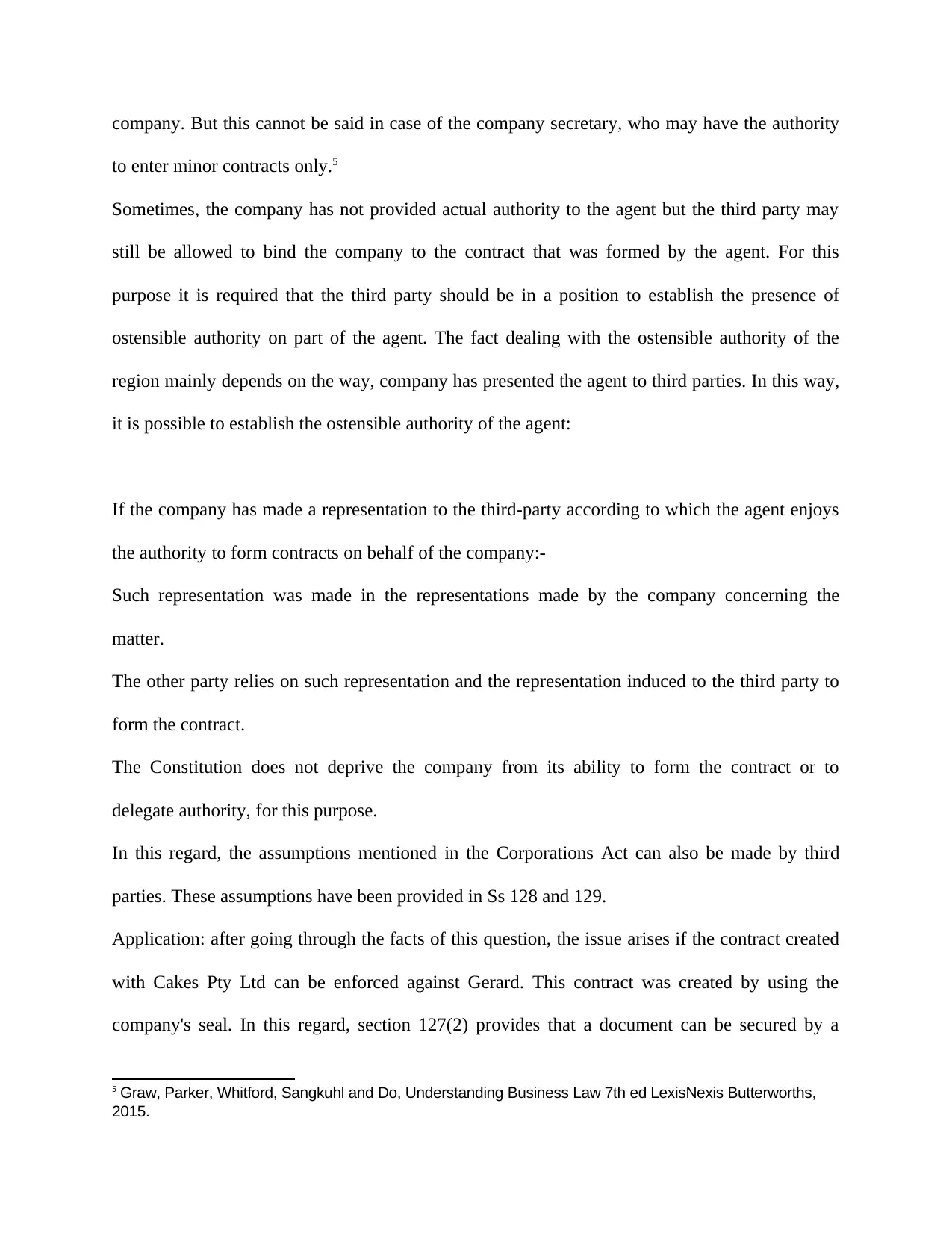
company. But this cannot be said in case of the company secretary, who may have the authority
to enter minor contracts only.5
Sometimes, the company has not provided actual authority to the agent but the third party may
still be allowed to bind the company to the contract that was formed by the agent. For this
purpose it is required that the third party should be in a position to establish the presence of
ostensible authority on part of the agent. The fact dealing with the ostensible authority of the
region mainly depends on the way, company has presented the agent to third parties. In this way,
it is possible to establish the ostensible authority of the agent:
If the company has made a representation to the third-party according to which the agent enjoys
the authority to form contracts on behalf of the company:-
Such representation was made in the representations made by the company concerning the
matter.
The other party relies on such representation and the representation induced to the third party to
form the contract.
The Constitution does not deprive the company from its ability to form the contract or to
delegate authority, for this purpose.
In this regard, the assumptions mentioned in the Corporations Act can also be made by third
parties. These assumptions have been provided in Ss 128 and 129.
Application: after going through the facts of this question, the issue arises if the contract created
with Cakes Pty Ltd can be enforced against Gerard. This contract was created by using the
company's seal. In this regard, section 127(2) provides that a document can be secured by a
5 Graw, Parker, Whitford, Sangkuhl and Do, Understanding Business Law 7th ed LexisNexis Butterworths,
2015.
to enter minor contracts only.5
Sometimes, the company has not provided actual authority to the agent but the third party may
still be allowed to bind the company to the contract that was formed by the agent. For this
purpose it is required that the third party should be in a position to establish the presence of
ostensible authority on part of the agent. The fact dealing with the ostensible authority of the
region mainly depends on the way, company has presented the agent to third parties. In this way,
it is possible to establish the ostensible authority of the agent:
If the company has made a representation to the third-party according to which the agent enjoys
the authority to form contracts on behalf of the company:-
Such representation was made in the representations made by the company concerning the
matter.
The other party relies on such representation and the representation induced to the third party to
form the contract.
The Constitution does not deprive the company from its ability to form the contract or to
delegate authority, for this purpose.
In this regard, the assumptions mentioned in the Corporations Act can also be made by third
parties. These assumptions have been provided in Ss 128 and 129.
Application: after going through the facts of this question, the issue arises if the contract created
with Cakes Pty Ltd can be enforced against Gerard. This contract was created by using the
company's seal. In this regard, section 127(2) provides that a document can be secured by a
5 Graw, Parker, Whitford, Sangkuhl and Do, Understanding Business Law 7th ed LexisNexis Butterworths,
2015.
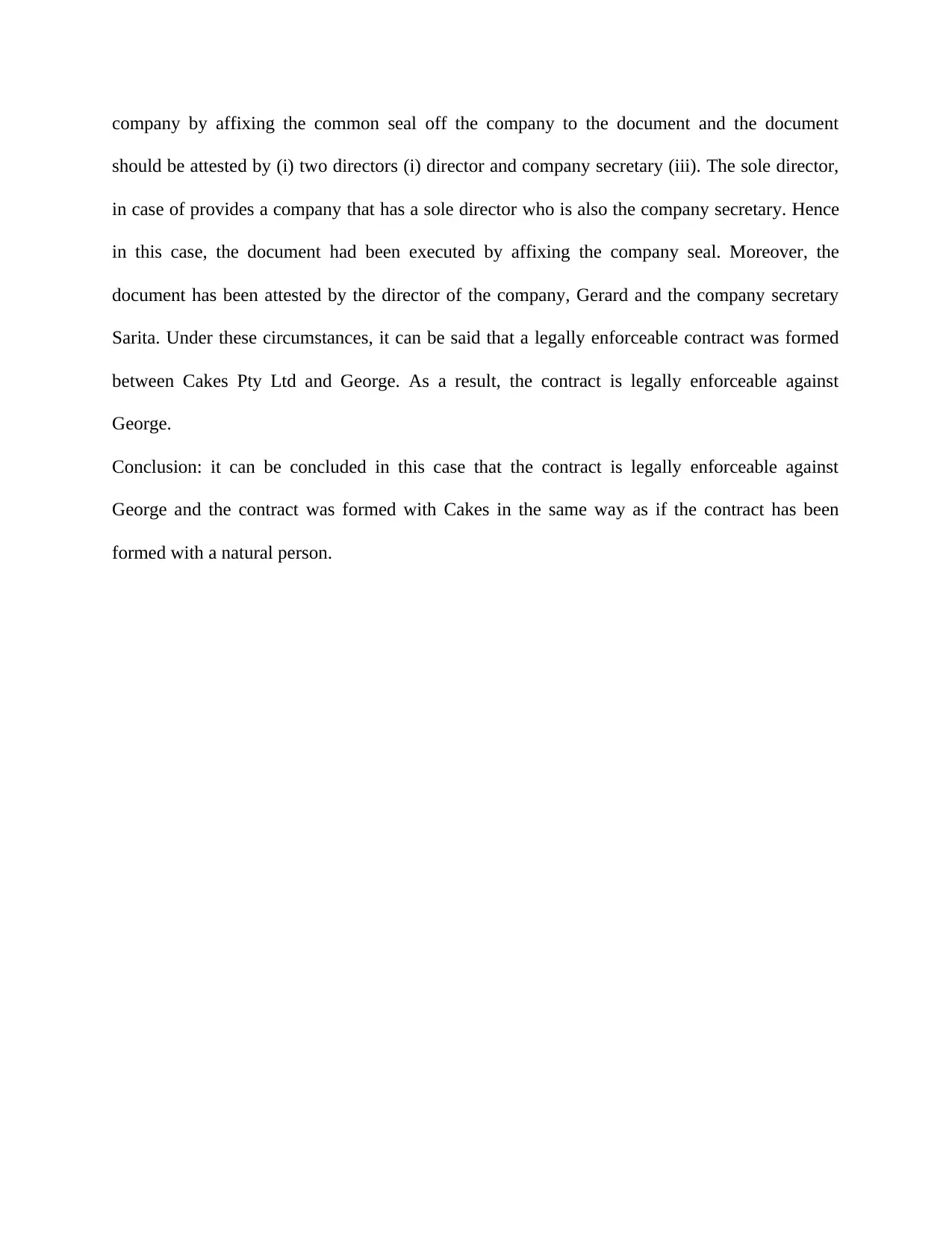
company by affixing the common seal off the company to the document and the document
should be attested by (i) two directors (i) director and company secretary (iii). The sole director,
in case of provides a company that has a sole director who is also the company secretary. Hence
in this case, the document had been executed by affixing the company seal. Moreover, the
document has been attested by the director of the company, Gerard and the company secretary
Sarita. Under these circumstances, it can be said that a legally enforceable contract was formed
between Cakes Pty Ltd and George. As a result, the contract is legally enforceable against
George.
Conclusion: it can be concluded in this case that the contract is legally enforceable against
George and the contract was formed with Cakes in the same way as if the contract has been
formed with a natural person.
should be attested by (i) two directors (i) director and company secretary (iii). The sole director,
in case of provides a company that has a sole director who is also the company secretary. Hence
in this case, the document had been executed by affixing the company seal. Moreover, the
document has been attested by the director of the company, Gerard and the company secretary
Sarita. Under these circumstances, it can be said that a legally enforceable contract was formed
between Cakes Pty Ltd and George. As a result, the contract is legally enforceable against
George.
Conclusion: it can be concluded in this case that the contract is legally enforceable against
George and the contract was formed with Cakes in the same way as if the contract has been
formed with a natural person.
⊘ This is a preview!⊘
Do you want full access?
Subscribe today to unlock all pages.

Trusted by 1+ million students worldwide
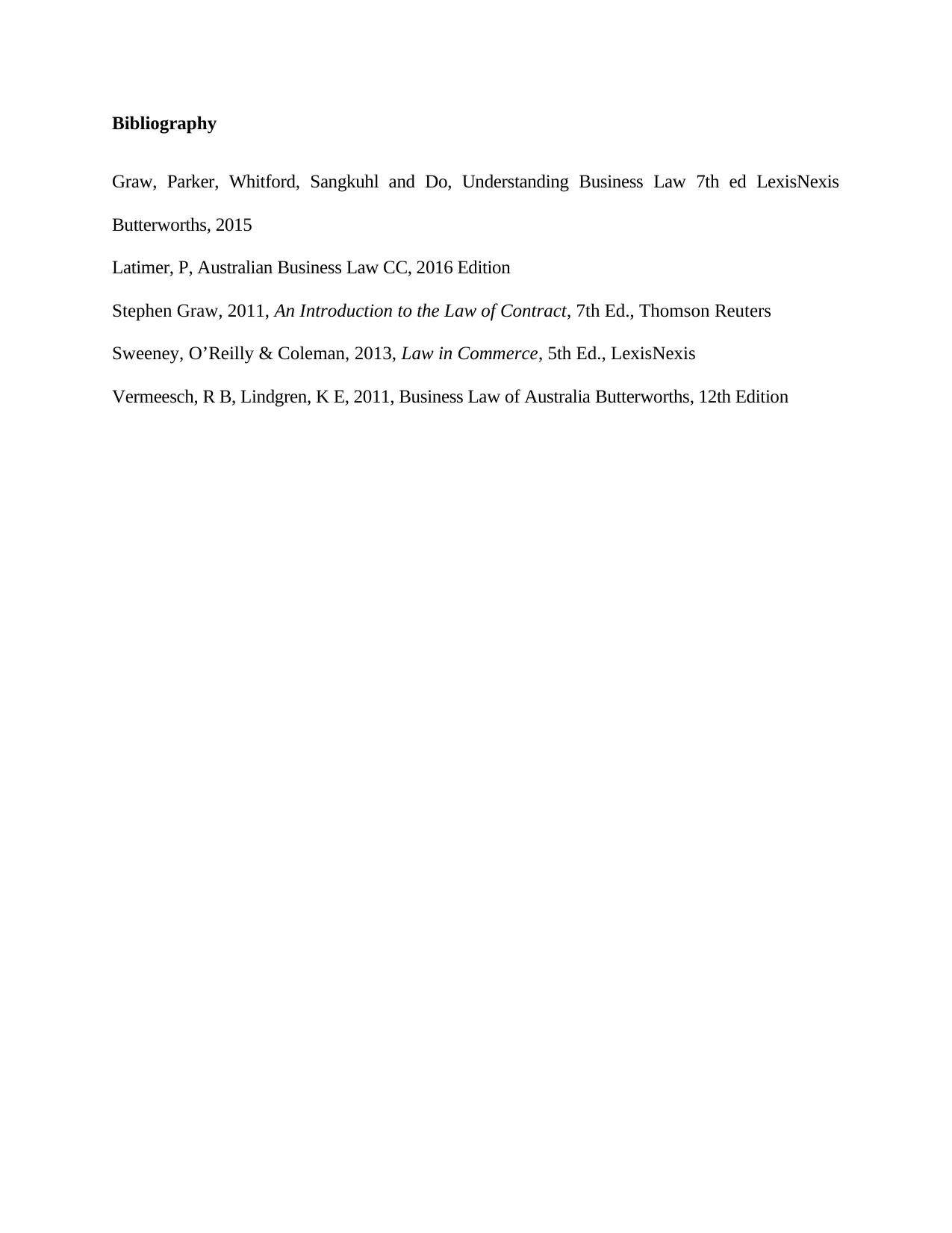
Bibliography
Graw, Parker, Whitford, Sangkuhl and Do, Understanding Business Law 7th ed LexisNexis
Butterworths, 2015
Latimer, P, Australian Business Law CC, 2016 Edition
Stephen Graw, 2011, An Introduction to the Law of Contract, 7th Ed., Thomson Reuters
Sweeney, O’Reilly & Coleman, 2013, Law in Commerce, 5th Ed., LexisNexis
Vermeesch, R B, Lindgren, K E, 2011, Business Law of Australia Butterworths, 12th Edition
Graw, Parker, Whitford, Sangkuhl and Do, Understanding Business Law 7th ed LexisNexis
Butterworths, 2015
Latimer, P, Australian Business Law CC, 2016 Edition
Stephen Graw, 2011, An Introduction to the Law of Contract, 7th Ed., Thomson Reuters
Sweeney, O’Reilly & Coleman, 2013, Law in Commerce, 5th Ed., LexisNexis
Vermeesch, R B, Lindgren, K E, 2011, Business Law of Australia Butterworths, 12th Edition
1 out of 7
Related Documents
Your All-in-One AI-Powered Toolkit for Academic Success.
+13062052269
info@desklib.com
Available 24*7 on WhatsApp / Email
![[object Object]](/_next/static/media/star-bottom.7253800d.svg)
Unlock your academic potential
Copyright © 2020–2026 A2Z Services. All Rights Reserved. Developed and managed by ZUCOL.





